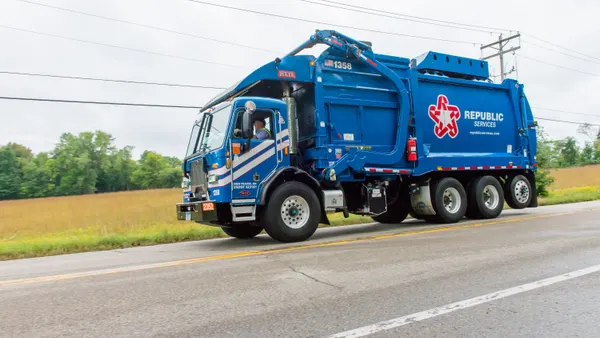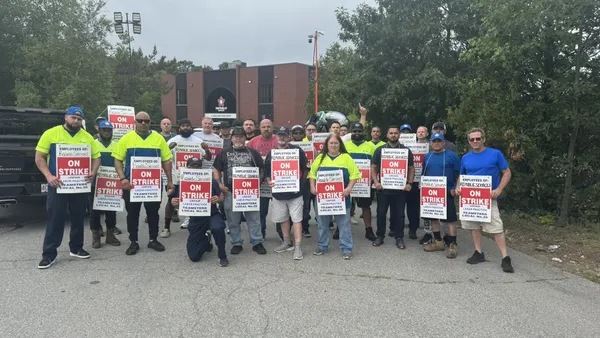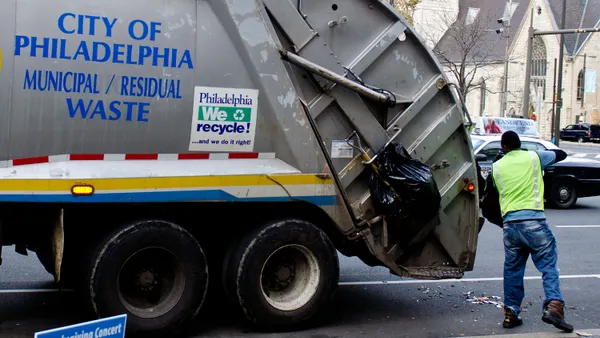The North Carolina counties of New Hanover, Brunswick, Pender and Onslow are your average East Coast communities, where neighborhood streets are abuzz with school buses, busy commuters and parents shuttling their children around town.
...Oh, and giant pink trash trucks.
In 2011, Kelly Buffalino, a new Wilmington, NC resident and mother of two, launched Pink Trash with her husband as a way to offer affordable trash collection service to the neighboring communities. Buffalino's personal journey with breast cancer inspired the vibrant color of the trucks, as well as the overall mission of the business: to save local lives through partnerships with local breast cancer foundations, Going Beyond the Pink and Pretty in Pink Wilmington.
The business, heavily operated and led by women, has taken off in the area through community engagement, loyal service and a recent partnership with Rubicon, which led the company to increase its customer base by 10%. Waste Dive caught up with Buffalino, Pink Trash president, and Shaun Kiviat, CFO, to learn how the business has impacted local families, how recent industry changes have rocked the business model and how fellow female executives should combat stereotypes.
This interview has been edited for clarity and brevity.
WASTE DIVE: Can you tell me a little bit about how you got started in the waste management industry?
KELLY BUFFALINO: My husband and I moved to Wilmington about eight years ago and we own an apartment complex here. I have an accounting background, and we were just basically analyzing the financial statements and looking for ways that we could save money. We realized that the trash fees were getting a bit excessive. When we called about our account, we were routed to a customer service representative that was not even in our city of Wilmington. We really didn't feel like we had a direct person to speak to regarding our fees and such. So we thought [waste collection] might be just another business that would be good to get into.
What's your personal experience with breast cancer?
BUFFALINO: I was diagnosed with breast cancer eight years ago at 41 years old and it was quite a shock. It happened at the same time that we moved here ... We started the trash business and we wanted to also get involved in a charitable organization and with everything happening at the same time, I met other people in charitable foundations here, and we decided that we would start the trash company and give back to a local breast cancer group and help people in the community at the same time.
Can you share a bit about the business model?
SHAUN KIVIAT: So back in 2011 the economy was still in down time ... Charities are great because you're able to raise money and do good things and help people, but then you got to go back the same people and ask for more money ... And back in 2011, it was very, very difficult. So we put together a financial model where you didn't have to ask anybody to write a separate check. Included in everybody's commercial and residential invoices is a 1% contribution that is [sent] to the foundation, and pays for cancer treatment for local women and men.
How much money have you raised since launching?
KIVIAT: Our first check was back in December 2011, for like, eight dollars and change. Now, to date, we've donated almost $200,000 in cash which actually pays for almost $2 million in lifesaving cancer treatment ... The foundation has a tremendous network of doctors who basically contribute part of their service fees. So for every $1 in cash that we're able to contribute, depending on which doctor they get, it's an average of $10 in treatment.
BUFFALINO: We also meet with the foundation on a quarterly basis when we give them our check and our portion also goes toward financial needs. So our checks can pay for a doctor's visit, co-pays, mammograms, food on the table, transportation to and from their doctor's visits ... Sometimes they give us names, sometimes they don't. Not everybody wants to share that information, but we get to hear the stories directly from the foundation.
Do you have any stories you can share about the success of advancing breast cancer treatment in the area?
KIVIAT: One of my favorite stories to tell is, back when we first started, we got a call one day in the office and they asked if we can donate a couple of pink trash cans for a charity run for Anne, a [physical education] teacher in the local school district and we said sure, we'd love to participate. So, I remember it was a Saturday morning and it was raining and [we] got in the pink pickup truck and we loaded up with pink trash cans and we got our pink "I Ran For Anne" t-shirts ... And we ended up doing the charity run in the rain. Now, six or seven years later, Anne is one of our closest friends. Kelly and Chris got us tickets to go to an NFL football game because it was on her bucket list one year, and you know, we built a tremendous personal relationship meeting her through the foundation.
As a small business owner, can you tell me how China's import ban is affecting you, especially being a company that has a charitable aspect to it?
KIVIAT: It's affecting the entire country, really. You look across from California to New York and there's a number of MRFs that are shut down in the last 12-24 months. The more facilities that are shut down, the harder it becomes on national, regional and local haulers like us. Our price has almost doubled in the last 30 days [for disposing recyclable materials].
BUFFALINO: And unfortunately a big part of that is to get the education out to the consumer, which is where Rubicon comes in ... They are working on decontaminating the recycling which is the big problem with China. So we'd like to see some of that put in place here ... Maybe that's something we can get into in the future, to educate the consumer and get them to recycle more and not think that we're out there to get them. We're really there to make the world a better place to live in.
"When you get to meet a lot of these people that you're helping, it becomes more than just a business."

Shaun Kiviat
CFO, Pink Trash
How does having a charitable aspect to your business affect competition and getting people to interact with you?
KIVIAT: It's a major part of what we do as an organization. You know our employees, this is very important to them. They actively participate in all of the charitable events that we go to throughout the year. At the end of the day, everybody needs trash service whether they're a business or resident, but we hope they choose us because they see what we're doing in the community, they see the impact, they see us helping local people. When you get to meet a lot of these people that you're helping, it becomes more than just a business.
BUFFALINO: And we never really spent a dime on advertising, all these years. We've gotten our name out there by sponsoring our local school's soccer team, baseball team, doing the annual "Touch a Truck" event every year ... We do Healthy Kids Day, Wounded Warrior Project. I mean 1% of our invoices does go to the cancer support group, but we also use our money to help support the community in those other ways.
What advice would you have for other women who are hoping to become part of the waste management industry and maybe launch a business similar to yours?
BUFFALINO: Well they have to plan to work really hard. Don't give up and don't back down ... Don't believe that we're the minority.










